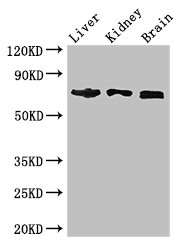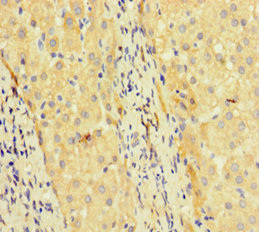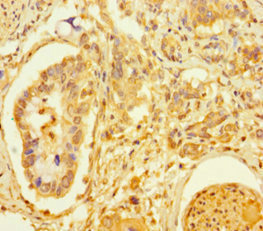TCF4 Antibody
-
货号:CSB-PA023302HA01HU
-
规格:¥440
-
促销:
-
图片:
-
Western Blot
Positive WB detected in: Mouse liver tissue, Mouse kidney tissue, Mouse brain tissue
All lanes: TCF4 antibody at 2.7μg/ml
Secondary
Goat polyclonal to rabbit IgG at 1/50000 dilution
Predicted band size: 72, 55, 49, 66, 65, 58, 68, 64, 70, 69, 63 kDa
Observed band size: 72 kDa -
Immunohistochemistry of paraffin-embedded human liver cancer using CSB-PA023302HA01HU at dilution of 1:100
-
Immunohistochemistry of paraffin-embedded human pancreatic cancer using CSB-PA023302HA01HU at dilution of 1:100
-
-
其他:
产品详情
-
产品名称:Rabbit anti-Homo sapiens (Human) TCF4 Polyclonal antibody
-
Uniprot No.:P15884
-
基因名:TCF4
-
别名:bHLHb19 antibody; Class B basic helix-loop-helix protein 19 antibody; E2 2 antibody; FECD3 antibody; Immunoglobulin transcription factor 2 antibody; ITF 2 antibody; ITF-2 antibody; ITF2 antibody; ITF2_HUMAN antibody; MGC149723 antibody; MGC149724 antibody; PTHS antibody; SEF 2 antibody; SEF-2 antibody; SEF2 1 antibody; SEF2 1A antibody; SEF2 1B antibody; SEF2 1D antibody; SEF2 antibody; SL3 3 enhancer factor 2 antibody; SL3-3 enhancer factor 2 antibody; TCF 4 antibody; TCF-4 antibody; TCF4 antibody; Transcription factor 4 antibody; Transcription factor 4, isoform C antibody; Transcription factor 4, isoform D antibody; Transcription factor 4, isoform E antibody; Transcription factor 4, isoform L antibody; Transcription factor 4, isoform M antibody; Transcription factor 4, isoform R antibody
-
宿主:Rabbit
-
反应种属:Human, Mouse
-
免疫原:Recombinant Human Transcription factor 4 protein (419-525AA)
-
免疫原种属:Homo sapiens (Human)
-
标记方式:Non-conjugated
本页面中的产品,TCF4 Antibody (CSB-PA023302HA01HU),的标记方式是Non-conjugated。对于TCF4 Antibody,我们还提供其他标记。见下表:
-
克隆类型:Polyclonal
-
抗体亚型:IgG
-
纯化方式:>95%, Protein G purified
-
浓度:It differs from different batches. Please contact us to confirm it.
-
保存缓冲液:Preservative: 0.03% Proclin 300
Constituents: 50% Glycerol, 0.01M PBS, PH 7.4 -
产品提供形式:Liquid
-
应用范围:ELISA, WB, IHC
-
推荐稀释比:
Application Recommended Dilution WB 1:2000-1:5000 IHC 1:20-1:200 -
Protocols:
-
储存条件:Upon receipt, store at -20°C or -80°C. Avoid repeated freeze.
-
货期:Basically, we can dispatch the products out in 1-3 working days after receiving your orders. Delivery time maybe differs from different purchasing way or location, please kindly consult your local distributors for specific delivery time.
相关产品
靶点详情
-
功能:Transcription factor that binds to the immunoglobulin enhancer Mu-E5/KE5-motif. Involved in the initiation of neuronal differentiation. Activates transcription by binding to the E box (5'-CANNTG-3'). Binds to the E-box present in the somatostatin receptor 2 initiator element (SSTR2-INR) to activate transcription. Preferentially binds to either 5'-ACANNTGT-3' or 5'-CCANNTGG-3'.
-
基因功能参考文献:
- In conclusion, this study provides genetic and some preliminary functional evidence to support the view that the TCF4 (NM_001243232) p.Pro29Thr mutation causes familial SAK. PMID: 28921696
- Hippo pathway transcription factor TEAD4 directly associates with the Wnt pathway transcription factor TCF4 via their DNA-binding domains, forming a complex on target genes. VGLL4 binds to this TEAD4-TCF4 complex to inhibit transactivation of both TCF4 and TEAD4. PMID: 28051067
- these results from tumor xenograft modeling depict a link between altered TCF4 expression and breast cancer chemoresistance. PMID: 29666142
- Long noncoding RNA AFAP1-AS1 enhances cell proliferation and invasion in osteosarcoma through regulating miR-4695-5p/TCF4-beta-catenin signaling. PMID: 29901121
- we found that CypA binds beta-catenin and is recruited to Wnt target gene promoters. By increasing the interaction between beta-catenin and TCF4, CypA enhances transcriptional activity. Our results demonstrate that CypA enhances GIC stemness, self-renewal, and radioresistance through Wnt/beta-catenin signaling PMID: 28790108
- Our results showed that the mRNA level of TCF4 may be associated with schizophrenia, its psychopathology, IQ and cognitive impairments in an Iranian group of patients with schizophrenia. PMID: 29105523
- The formation of the beta-catenin/TCF4 complex was disrupted by HI-B1 due to the direct interaction of HI-B1 with beta-catenin. Colon cancer patient-derived xenograft (PDX) studies showed that a tumor with higher levels of beta-catenin expression was more sensitive to HI-B1 treatment, compared to a tumor with lower expression levels of beta-catenin PMID: 29033371
- Expression of TCF4 at the mRNA and protein level may be significant in the etiology of recurrent depressive disorder and it is not dependent on sex and age. PMID: 28341444
- Data show that silencing of immunoglobulin transcription factor 2 (ITF-2) by siRNA significantly enhanced susceptibility to the MEK inhibitor selumetinib (AZD6244) in resistant cells. PMID: 28574827
- Expression of TCF4 in a neural progenitor cell line derived from the developing human cerebral cortex was reduced using RNA interference. Genes that were differentially expressed following TCF4 knockdown were highly enriched for involvement in the cell cycle. There was a nonsignificant trend for genetic association between the differentially expressed gene set and schizophrenia. PMID: 27689884
- TCF4 knockdown promoted HepG-2 cell differentiation and inhibited tumor formation, and TCF4 could be the potential downstream target for clopidogrel therapy PMID: 27542264
- A frameshift-causing partial TCF4 gene deletion was identified in an adult patient with mild ID and nonspecific facial dysmorphisms but without the typical features of Pitt-Hopkins syndrome. A nonsense variant within exon 8 was identified in a child presenting with a severe phenotype largely mimicking PTHS. PMID: 28807867
- rs613872, rs17595731, and CTG repeat expansions in intronic region of TCF4 are associated with increased risk of sporadic late-onset FECD in the Indian cohort studied PMID: 29044056
- Black patients with Fuchs' dystrophy were less likely than white patients to demonstrate CTG18.1 allele expansion. PMID: 29196769
- Examination of X-ray structures of the closely related TCF3 and USF1 bound to DNA suggests TCF3 can undergo a conformational shift to preferentially bind to 5hmC while the USF1 basic region is bulkier and rigid precluding a conformation shift to bind 5hmC. These results greatly expand the regulatory DNA sequence landscape bound by TCF4. PMID: 27485769
- Array-comparative genomic hybridization confirmed a de novo paternal deletion of the 15q11.2q13 region and exome sequencing identified a second mutational event in both girls, which was a novel variant c.145+1G>A affecting a TCF4 canonical splicing site inherited from the mosaic mother PMID: 28631899
- The CTG18.1 repeat expansion may reduce gene expression of TCF4 and ZEB1, suggesting that a mechanism triggering a loss of function may contribute to FECD. PMID: 28608272
- repeat expansion showed stronger association than the most significantly associated SNP, rs613872, in TCF4, with the disease in the Australian cohort PMID: 28832669
- Although validation in additional patients is required, the findings suggest that the dysmorphic features and severe intellectual disability characteristic of PTHS are partially rescued by overexpression of those short TCF4 transcripts encoding a nuclear localization signal, a transcription activation domain, and the basic helix-loop-helix domain. PMID: 27179618
- Altered DNA methylation in TCF4 involves in the etiology of Bipolar disorder and Major Depressive disorder . PMID: 27440233
- We found that the genotype "AG" of rs9320010 and "GA" of rs7235757 decreased SCZ risk. In the genetic model analysis, we also observed that the allele "A" of rs9320010 and "G" of rs7235757 were inversely related with the risk of SCZ in the dominant model. Our study indicated that rs9320010, rs7235757, and rs1452787 were prominently associated with SCZ. PMID: 27103199
- Our work suggests that DM1 patients are at risk for Fuchs' endothelial corneal dystrophy (FECD). DMPK mutations contribute to the genetic burden of FECD but are uncommon. We establish a connection between two repeat expansion disorders converging upon RNA-MBNL1 foci and FECD. PMID: 28886202
- We demonstrate that expansion of the CTG18.1 trinucleotide repeat in TCF4 is associated with a higher risk of corneal transplantation at a younger age, assessed for the first time in a multiracial population sample with Fuchs corneal dystrophy from the United States. PMID: 27755191
- Corneal endothelium from FECD patients harbors a unique signature of mis-splicing events due to CTG TNR expansion in the TCF4 gene, consistent with the hypothesis that RNA toxicity contributes to the pathogenesis of FECD. PMID: 28118661
- Results identify TCF4 as a crucial transcriptional regulator required for maintenance of blastic plasmacytoid dendritic cell neoplasm. PMID: 27846392
- Results show that MLL-AF9 reduces Id2 and increases E2-2 expression to drive and sustain leukemia stem cell potential in MLL-rearranged acute myeloid leukemia (AML). Low expression of Id2 or of an Id2 gene signature is associated with poor prognosis in not only MLL-rearranged but also t(8;21) AML patients. PMID: 27374225
- Analysis of SLC4A11, ZEB1, LOXHD1, COL8A2 and TCF4 gene sequences in a multi-generational family with late-onset Fuchs corneal dystrophy found no evidence for found polymorophisms causing the disease in this specific pedigree. PMID: 27121161
- Among the TCF4 variants, rs12966547 and rs8766 were significantly associated with earlier schizophrenia age of onset. PMID: 27305091
- We suggest that screening for mutations in TCF4 could be considered in the investigation of non-syndromic intellectual disability. PMID: 27132474
- expanded TGC allele with more than 50 TGC repeats in intron 2 and the described risk allele G of the polymorphism rs613872 in intron 3 of the TCF4 gene appear as an association to FECD. The chance to be affected by FECD is up to 30 times higher. With molecular genetics also donors with clinically unknown FECD may be detected. PMID: 26280645
- Studied promoter methylation of ITF2 and APC and associated microsatellite instability in two case-case studies nested in colorectal cancer. PMID: 26884349
- The data suggest that changes in the transcript level containing constitutive TCF4 exon encoding the amino-terminal part of the protein seem not to contribute to disease pathogenesis. PMID: 26451375
- ZEB1 mutations and TCF4 rs613872 changes are associated with late onset Fuchs endothelial corneal dystrophy in patients from Northern India. PMID: 26622166
- Results suggested that the TCF4 rs2958182 variant may play an important role in the susceptibility to schizophrenia PMID: 26343600
- The TCF4 triplet repeat expansion resulted in a more severe form of Fuchs endothelial corneal dystrophy , with clinical and surgical therapeutic implications. PMID: 26401622
- No significant association (P < 0.05) was found between TCF4 rare sequence variants and schizophrenia PMID: 26010163
- This meta-analysis suggested a genetic association between four TCF4 polymorphisms (rs613872, rs2286812, rs17595731, and rs9954153) and the risk of Fuchs' endothelial dystrophy. PMID: 26087656
- A monoallelic expansion of CTG18.1 contributes to increased disease severity and is causal at (CTG)n>103, whereas a biallelic expansion is sufficient to be causal for FCD at (CTG)n>40. PMID: 26200491
- These findings show for the first time in a Japanese population the association of the TNR expansion in TCF4 with FECD. PMID: 26218914
- High TCF4 expression is associated with acute myeloid leukemia progression. PMID: 25150259
- This study showed that no effect of schizophrenia risk genes TGF4 on macroscopic brain structure. PMID: 25217366
- Our results showed that there was no significant association between any of five reported SNPs of TCF4 and PTPRG genes and the occurrence of Fuchs' endothelial dystrophy; only rs7640737 in PTPRG showed an increased risk for corneal dystrophy. PMID: 23758498
- TCF4 rs613872 is strongly associated with FCD in Caucasians. PMID: 25299301
- TCF4 is an important regulator of neurodevelopment and epithelial-mesenchymal transition. PMID: 24594265
- These findings indicate that beta-catenin/TCF-4 is an important pathway for restricted HIV-1 replication in monocytes and plays a significant role in potentiating HIV-1 replication as monocytes differentiate into macrophages. PMID: 24862328
- TCF4 poses a major contributor to FECD manifestation globally, with a significant association of rs17089887 and CTG18.1 allele in the Indian population. PMID: 25342617
- In human colorectal cancer cell lines and tissue samples, ITF2 appears to prevent activation of the beta-catenin-TCF4 complex and transcription of its gene targets. PMID: 24846398
- Nine novel deletion mutations in TCF4 in Pitt-Hopkins Syndrome are described. PMID: 18781613
- Transethnic replication of the association between the CTG18.1 repeat expansion in the TCF4 gene and FECD suggests it is a common, causal variant shared in Eurasian populations conferring significant risk for the development of FECD. PMID: 25298419
- Complete sequencing of the TCF4 genomic region revealed no single causative variant for Fuchs' endothelial corneal dystrophy (FECD). The intronic trinucleotide repeat expansion within TCF4 continues to be more strongly associated with FECD PMID: 25168903
显示更多
收起更多
-
相关疾病:Pitt-Hopkins syndrome (PTHS); Corneal dystrophy, Fuchs endothelial, 3 (FECD3)
-
亚细胞定位:Nucleus.
-
组织特异性:Expressed in adult heart, brain, placenta, skeletal muscle and to a lesser extent in the lung. In developing embryonic tissues, expression mostly occurs in the brain.
-
数据库链接:
HGNC: 11634
OMIM: 602272
KEGG: hsa:6925
STRING: 9606.ENSP00000346440
UniGene: Hs.605153
Most popular with customers
-
-
Phospho-YAP1 (S127) Recombinant Monoclonal Antibody
Applications: ELISA, WB, IHC
Species Reactivity: Human
-
-
-
-
-
-
























